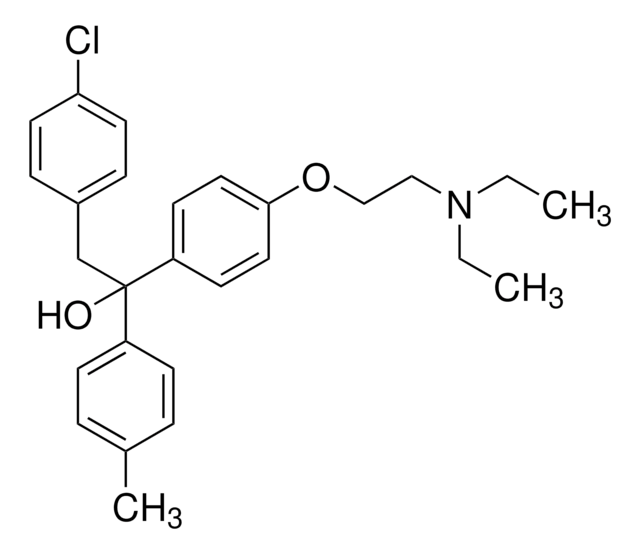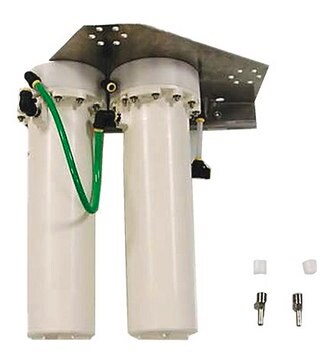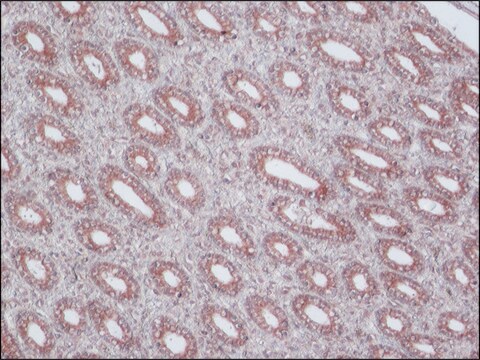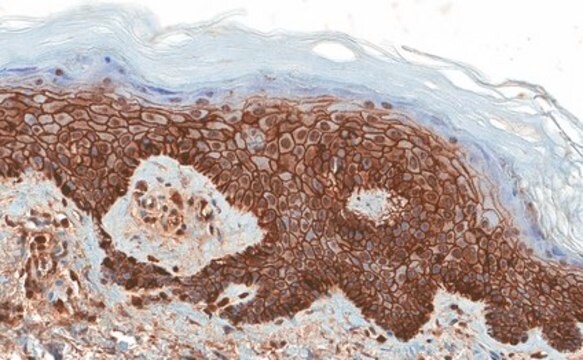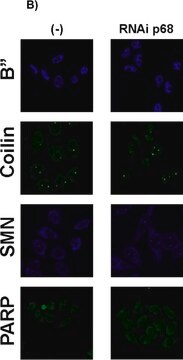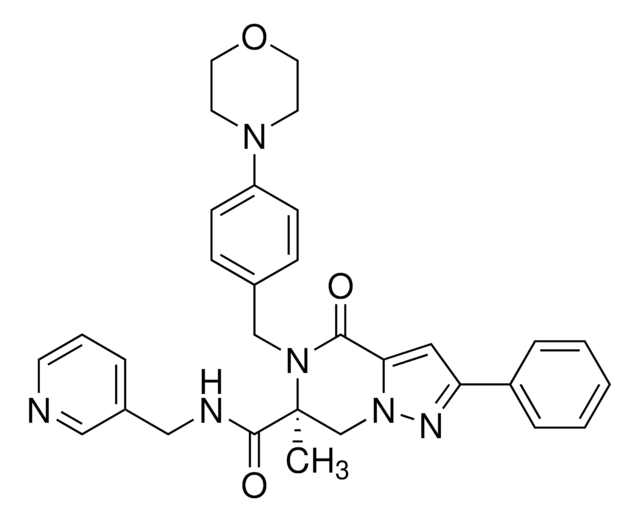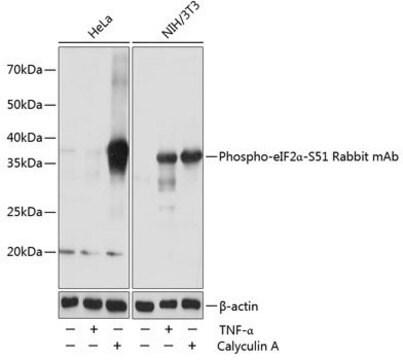おすすめの製品
由来生物
mouse
品質水準
抗体製品の状態
purified immunoglobulin
抗体製品タイプ
primary antibodies
クローン
AE5, monoclonal
化学種の反応性
rabbit, bovine
テクニック
immunofluorescence: suitable
immunohistochemistry: suitable
western blot: suitable
アイソタイプ
IgG1κ
NCBIアクセッション番号
UniProtアクセッション番号
輸送温度
wet ice
ターゲットの翻訳後修飾
unmodified
遺伝子情報
human ... KRT3(3850)
詳細
Cytokeratin 3, also known as 65kDa Cytokeratin or Keratin K3 is a specific keratin found primarily in the corneal epithelium and minorly in other epithelium like that of the esophagus. The corneal epithelium tissue forms the outermost layer of the cornea, which is the clear front covering of the eye. Keratins are divided into two primary types based upon their isoelectric mobility and size, acidic, or type 1:40-55kDa, and basic to neutral or type 2, 56-70kDa. Cytokeratin 3 is a type II cytokeratin. Type II cytokeratins form pairs with other cytokeratins. Cytokeratin 3 is expressed in the corneal epithelium with Cytokeratin 12. Together Cytokeratin 3 and Cytokeratin 12 form molecules known as intermediate filaments. These filaments assemble into strong networks that provide strength and resilience to the corneal epithelium. Mutations in Cytokeratin 3 have been associated with Meesmann′s Corneal Dystrophy a disease characterized by fragility of the anterior corneal epithelium.
免疫原
Whole cells corresponding to Rabbit Keratin, type II cytosleletal 3.
アプリケーション
Research Category
細胞骨格
細胞骨格
Research Sub Category
サイトケラチン
サイトケラチン
Immunohistochemistry Analysis: A 1:1000 dilution from a representative lot detected Keratin K3/K76 in bovine cornea epithelial cells.
Immunohistochemistry Analysis: A representative lot was used by an independent laboratory in Keratin 3 expressed epithelial cells on the surface of submerged and AL explants, indicating that they were derived from limbal progenitor cells via migration. (Kawakita, T., et al. (2005) Am J Pathol, 167:381-93.).
Western Blotting Analysis: A representative lot was used by an independent laboratory in Rabbit epithelial Keratin lysate. (Schermer, A, et al. (1986) J. Cell Biol., 103: 49-62).
Western Blotting Analysis: A representative lot was used by an independent laboratory in rabbit corneal tissue lysate. (Cooper, D., et al. (1986) J. Biol. Chem., 261: 4646-54).
Immunocytochemistry Analysis: A representative lot was used by an independent laboratory in human limbal stem cells cultured in medium supplemented with human EGF. (Sharifi, A.M., et al. (2010) Biocell. 34(1):53-55).
Immunofluorescence Analysis: A representative lot was used by an independent laboratory in rabbit corneal and limbal tissues, limbal explant, and epithelial outgrowth on human AM. (Wang D.Y., et al. (2003) Invest Ophthalmol Vis Sci. 44(11):4698-704).
Immunofluorescence Analysis: A representative lot was used by an independent laboratory inRabbit corneal epithelial Keratin cells. (Schermer, A, et al. (1986) J. Cell Biol., 103: 49-62).
Immunohistochemistry Analysis: A representative lot was used by an independent laboratory in Keratin 3 expressed epithelial cells on the surface of submerged and AL explants, indicating that they were derived from limbal progenitor cells via migration. (Kawakita, T., et al. (2005) Am J Pathol, 167:381-93.).
Western Blotting Analysis: A representative lot was used by an independent laboratory in Rabbit epithelial Keratin lysate. (Schermer, A, et al. (1986) J. Cell Biol., 103: 49-62).
Western Blotting Analysis: A representative lot was used by an independent laboratory in rabbit corneal tissue lysate. (Cooper, D., et al. (1986) J. Biol. Chem., 261: 4646-54).
Immunocytochemistry Analysis: A representative lot was used by an independent laboratory in human limbal stem cells cultured in medium supplemented with human EGF. (Sharifi, A.M., et al. (2010) Biocell. 34(1):53-55).
Immunofluorescence Analysis: A representative lot was used by an independent laboratory in rabbit corneal and limbal tissues, limbal explant, and epithelial outgrowth on human AM. (Wang D.Y., et al. (2003) Invest Ophthalmol Vis Sci. 44(11):4698-704).
Immunofluorescence Analysis: A representative lot was used by an independent laboratory inRabbit corneal epithelial Keratin cells. (Schermer, A, et al. (1986) J. Cell Biol., 103: 49-62).
This Anti-Keratin K3/K76 Antibody, clone AE5 is validated for use in Western Blotting and Immunohistochemistry and Immunofluorescence for the detection of Keratin K3/K76.
品質
Evaluated by Western Blotting in Rabbit eye (cornea) cell lysate.
Western Blotting Analysis: 0.05 µg/mL of this antibody detected Keratin K3/K76 in 10 µg of Rabbit eye (cornea) cell lysate.
Western Blotting Analysis: 0.05 µg/mL of this antibody detected Keratin K3/K76 in 10 µg of Rabbit eye (cornea) cell lysate.
ターゲットの説明
~60 kDa observed
関連事項
Replaces: CBL218
物理的形状
Protein G Purified
Format: Purified
Purified mouse monoclonal IgG1κ in buffer containing 0.1 M Tris-Glycine (pH 7.4), 150 mM NaCl with 0.05% sodium azide.
保管および安定性
Stable for 1 year at 2-8°C from date of receipt.
その他情報
Concentration: Please refer to lot specific datasheet.
免責事項
Unless otherwise stated in our catalog or other company documentation accompanying the product(s), our products are intended for research use only and are not to be used for any other purpose, which includes but is not limited to, unauthorized commercial uses, in vitro diagnostic uses, ex vivo or in vivo therapeutic uses or any type of consumption or application to humans or animals.
適切な製品が見つかりませんか。
製品選択ツール.をお試しください
保管分類コード
12 - Non Combustible Liquids
WGK
WGK 1
引火点(°F)
Not applicable
引火点(℃)
Not applicable
適用法令
試験研究用途を考慮した関連法令を主に挙げております。化学物質以外については、一部の情報のみ提供しています。 製品を安全かつ合法的に使用することは、使用者の義務です。最新情報により修正される場合があります。WEBの反映には時間を要することがあるため、適宜SDSをご参照ください。
Jan Code
CBL218-I:
試験成績書(COA)
製品のロット番号・バッチ番号を入力して、試験成績書(COA) を検索できます。ロット番号・バッチ番号は、製品ラベルに「Lot」または「Batch」に続いて記載されています。
Differentiation-related expression of a major 64K corneal keratin in vivo and in culture suggests limbal location of corneal epithelial stem cells.
Schermer, A; Galvin, S; Sun, TT
The Journal of cell biology null
Intrastromal invasion by limbal epithelial cells is mediated by epithelial-mesenchymal transition activated by air exposure.
Kawakita, T; Espana, EM; He, H; Li, W; Liu, CY; Tseng, SC
The American Journal of Pathology null
Monoclonal antibody analysis of bovine epithelial keratins. Specific pairs as defined by coexpression.
Cooper, D and Sun, T T
The Journal of Biological Chemistry, 261, 4646-4654 (1986)
Propagation and phenotypic preservation of rabbit limbal epithelial cells on amniotic membrane.
Wang, DY; Hsueh, YJ; Yang, VC; Chen, JK
Investigative Ophthalmology & Visual Science null
ライフサイエンス、有機合成、材料科学、クロマトグラフィー、分析など、あらゆる分野の研究に経験のあるメンバーがおります。.
製品に関するお問い合わせはこちら(テクニカルサービス)

